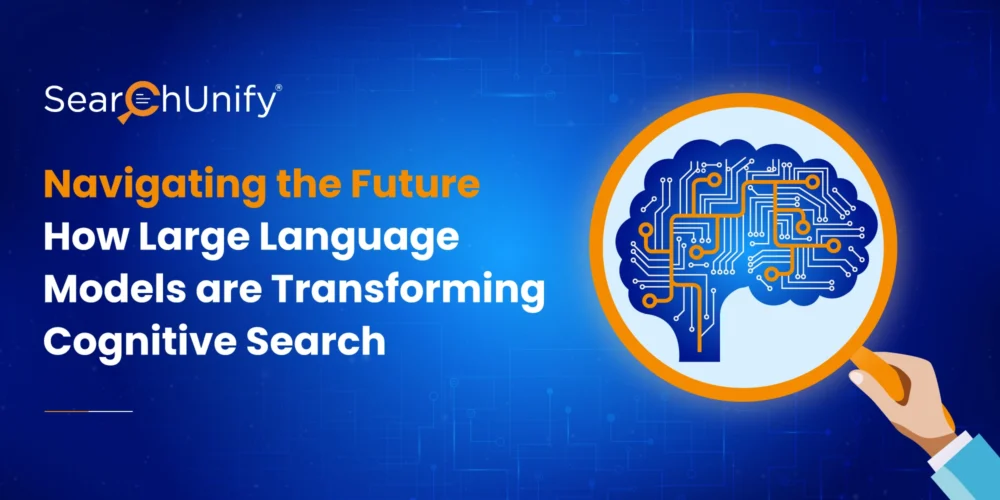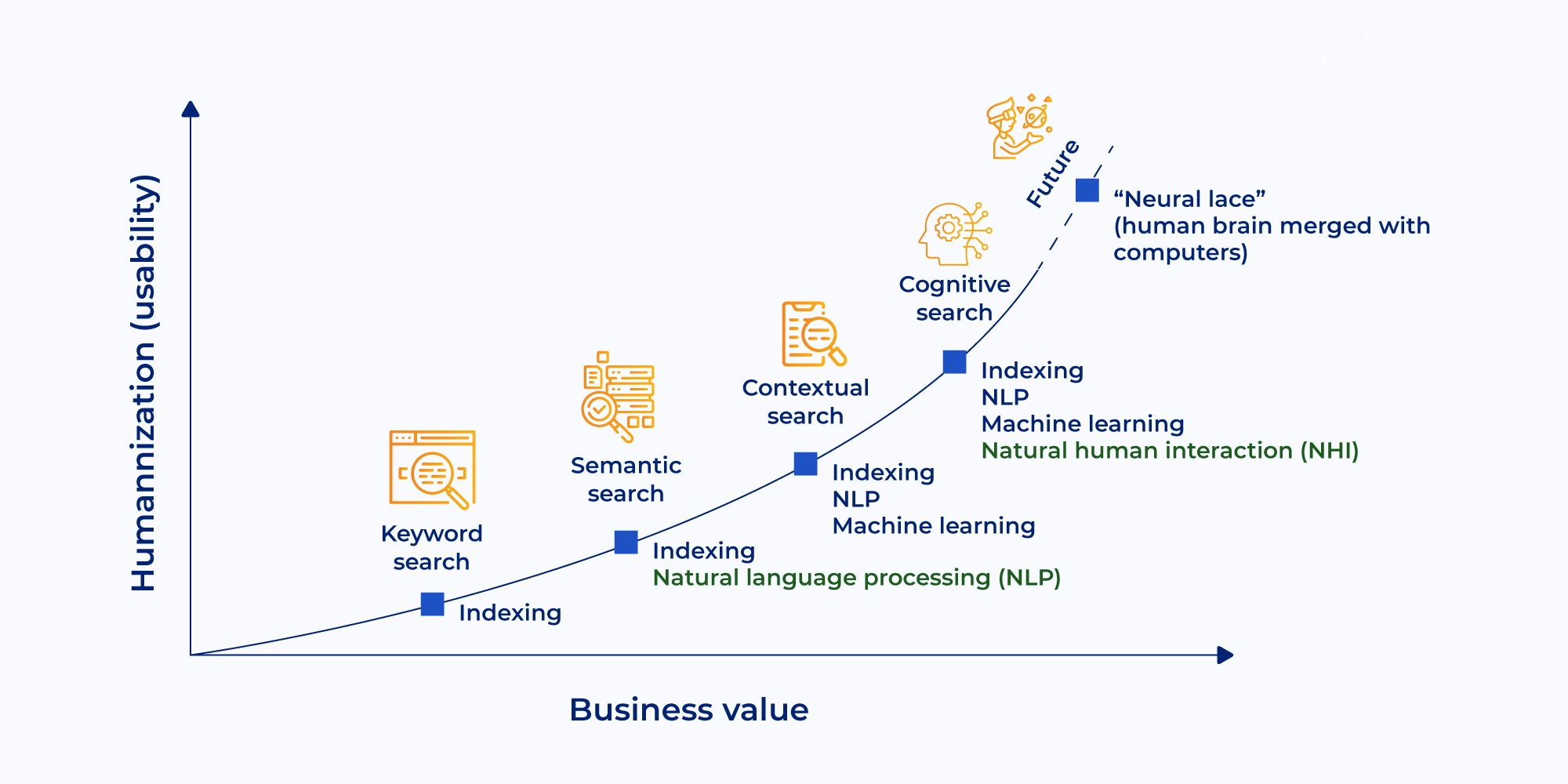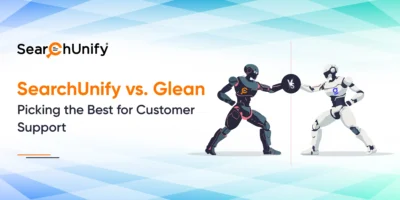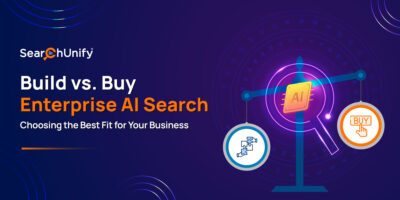
Did you know that the cognitive search market is expected to grow from USD 4.6 billion in 2022 to USD 8.2 billion by 2027 at a CAGR of 12.3%?
Modern organizations are flooded with vast amounts of information but challenges like data silos and poor content findability hamper user experiences. This is where cognitive search comes into play. It is a next-generation solution that harnesses Artificial Intelligence (AI) and Machine Learning (ML), to help enterprises extract relevant information from multiple, diverse sources and present it in a unified manner.
That’s just the tip of the iceberg! The advent of Large Language Models (LLMs) has further revolutionized cognitive search by enhancing natural language understanding, providing contextual relevance, and handling unstructured data. As a result, businesses now can provide more relevant, personalized, and intent-driven results to user queries.
Let’s dive deeper into the concept of LLM-powered cognitive search and the latest trends that are making waves across industries.
Evolution of Cognitive Search
The evolution of cognitive search has been nothing short of remarkable. Initially, it relied on traditional keyword-based search techniques, but with the emergence of AI and ML, it has undergone significant advancements. Cognitive search now leverages natural language processing, deep learning, and knowledge graphs to deliver more accurate, context-aware results. It can analyze unstructured data, understand user intent, and provide personalized recommendations.
| Basis | Traditional Search | Cognitive Search |
| Data Analysis | Limited to keyword matching | Utilizes AI & ML for semantic deep analysis and contextual understanding of data |
| Result Quality | Relies on relevance ranking algorithms | Provides context-aware and personalized results |
| Data Sources | Primarily searches structured data | Can analyze and search both structured and unstructured data like documents, images, and audio |
| User Interaction | Requires specific keywords or queries | Supports natural language queries and offers intelligent recommendations |
| Insight Generation | Provides basic information retrieval | Extracts insights, discover relationships, and generates meaningful insights for next-best action |
| Scalability | May struggle with large and diverse data sets | Handles vast amounts of data from multiple sources effectively |
Further, the integration of Large Language Models (LLMs) in cognitive search helps unlock next-level user experiences. How you may ask? LLMs enable cognitive search engines to understand and interpret natural language queries accurately, leading to more relevant search results.
Additionally, LLMs empower cognitive search to discover hidden patterns within the data. As they can analyze and comprehend unstructured data such as documents, images, and audio, cognitive search engines can extract insights from a wide range of sources. This enables organizations to gain a deeper understanding of the user requirements and uncover valuable connections and relationships that might have otherwise been overlooked.

Top Cognitive Search Trends in the Era of Large Language Models (LLMs)
The implementation of LLMs has paved the way for advanced cognitive search trends. These include:
- Enhanced Natural Language UnderstandingLLMs have significantly enhanced the natural language understanding capabilities of cognitive search systems. These technologies enable systems to comprehend complex queries, interpret user intent, and deliver more accurate and contextually relevant search results.
- Contextual Content GenerationLLMs empower search systems to go beyond keyword matching and develop content that aligns with the user’s query and context. By understanding the semantics and nuances of the search query, cognitive search systems can provide comprehensive results, enabling users to extract meaningful insights from the generated content.
- Unleashing Insights from Unstructured DataTraditional search methods often struggle with unstructured data, but with the advent of LLMs, a cognitive search can extract insights from diverse sources such as documents, images, and audio files. This opens up new possibilities for discovering patterns, relationships, and hidden insights that were previously buried within unstructured data.
- Personalized RecommendationsLLMs have enabled cognitive search systems to offer personalized recommendations based on user preferences and historical search patterns. This approach enhances the relevance of search results, enabling users to explore information that is most relevant to their specific needs.
Are you ready to implement LLM-powered search?
Request a demoMapping the Future!
The future of cognitive search is brimming with possibilities. As breakthrough technologies like LLMs continue to advance, here are some exciting trends that we can expect in the realm of cognitive search:
- Advanced Multimodal Search: In the coming years, cognitive search systems will be able to analyze and understand information from various modalities, allowing users to search and explore data more holistically and comprehensively.
- Explainability and Interpretability: Future advancements will focus on developing techniques that enable cognitive search systems to provide transparent explanations, enhance user trust, and facilitate better decision-making based on search outcomes.
- Continuous Learning and Adaptation: Future trends are expected to revolve around developing self-learning capabilities including identifying new patterns, adapting to changing user preferences, and incorporating user feedback to improve search relevance and accuracy.
- Integration with Knowledge Graphs: By leveraging LLMs alongside knowledge graphs, cognitive search engines will enable users to navigate complex data landscapes, uncover hidden associations, and gain a deeper understanding of the underlying knowledge.
- Augmented Intelligence and Collaboration: As LLMs continue to evolve, cognitive search systems will become trusted partners, assisting users in complex information exploration, generating insights, and facilitating collaborative decision-making processes.
Ready to Unlock Next Level User Experience?
It’s beyond doubt that LLM-fueled cognitive search is not only promising but transformative. With advancements in multimodal search, explainability, continuous learning, knowledge graph integration, and augmented intelligence, cognitive search is poised to revolutionize how organizations interact and support users.
At SearchUnify, we leverage the dynamic duo of cognitive search and LLMs to empower enterprises to drive more accurate, relevant, and contextual user experiences at scale. Interested in witnessing our next-generation cognitive search in action? Request a free trial today!











